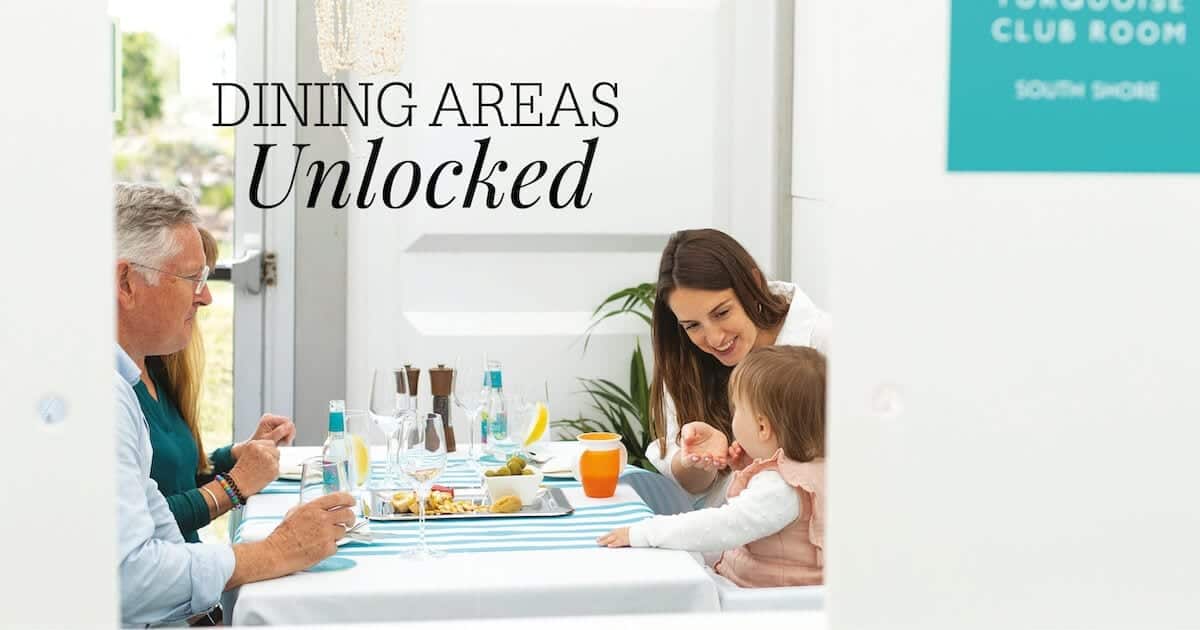
There is no one-size-fits-all in hospitality, particularly at the higher end.
Post-lockdown guidelines are not exhaustive. Bill Lumley looks at some of the creative approaches to the dining challenge made by luxury hotels and B&Bs.
The chances are you are tiring of reams of new guidelines and interpretations of guidelines issued by various trade bodies that provide you with rules that officially enable you to operate safely in this post-lockdown age.
Here we take a look at some inventive interpretations of guidance to enable you to host and feed your guests in your dining area.
Breakfast
“From our point of view breakfast now takes a lot longer and takes considerably more effort to serve the guests.”
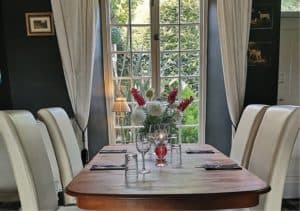
The disappearance of the breakfast buffet is one of the most significant changes in routine to hit B&Bs and hotels. However, this has not been so severe everywhere. For example, manager of The Kings Arms Inn in Somerset Sarah Vigo says: “When it comes to breakfast there hasn’t been such a great change, as all our cooked food is table service anyway.”
The only major issue relates to the serving of cereal and the juices, she says. “That was all self-service, and there were toasters for guests to make their own toast while waiting for their fry-up or their salmon and egg. Since reopening now we are just providing these ourselves, with guests ordering them as opposed to helping themselves.”
She is happy to report that three weeks after reopening, the new arrangements have worked out well. “Chef completely revamped the breakfast menu with things like poached egg and avocado and bircher pots, which is like Granola and a yoghurt that guests can take with them if they have to leave early and is in addition to the traditional bowl of cereal and a fry-up breakfast. These are listed on the menu, but people haven’t really been asking for cereals. We have taken more orders for poached eggs and avocado than we have for fry-ups.”
She adds: “It has gone really smoothly, and I actually think it’s been a nicer way of serving, taking away the help-yourself approach.”
The new regime means considerably less food wastage, she says. “We used to put out big jugs of milk and fruit juice and a lot of it went to waste. Now we will pour our guests a glass of orange juice to drink.”
Crowd control
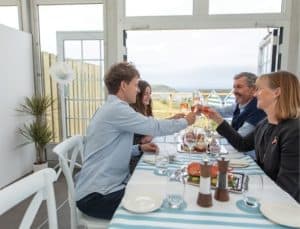
The World’s Best B&B for the second year running, The 25 in Torquay is limiting its guest numbers only selling up to four out of its six rooms in order to avoid having too many people crowding the dining room at the same time for breakfast.
Co-owner Andy Banner-Price says: “When we have three or four rooms booked, we ask guests for their chosen time slot for breakfast the day before so we can try to split them up somewhat.
Breakfast at The 25 was traditionally served as a buffet and has had to be restructured for as long as restrictions are in place. Andy explains: “Everything including every aspect of the buffet has to be served individually, to all guests, down to salt, pepper and jams. All the things that would have been on the table, and then all the buffet items including cereals, yoghurts, fruit salad, juices – the whole lot has to be served to them rather than any of our guests helping themselves.”
He adds: “If the guests did their usual trick of all coming down for breakfast at once then it would take forever to serve everybody.”
Sustaining quality
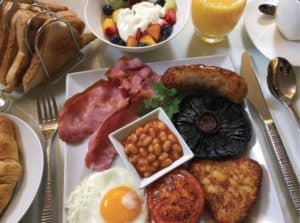
The 25 is still offering all its guests the same broad range and high quality of breakfast food and drink as before the virus crisis. “It just means everybody has to ask for what they want to eat rather than helping themselves,” he says.
Fortunately not everything has had to change. For example, all the B&B’s suppliers are back as they were before the crisis. “The butcher is working as normal, and we haven’t had to change anything with regard to the actual menu itself. A lot of the items were homemade anyway,” he adds.
In some regards the leading world class breakfast experience has taken a knock from the COVID-19 contact restrictions. For example, instead of guests using elegant grinders, both salt and pepper are now provided in sachets, which they proprietors have had to order in for the first time. “We have sachets for sugar and sweeteners too, but we already had these for the bedrooms anyway,” he says.
“We have tried to keep the breakfast experience as similar to normal as possible. All we have done is tweak it so you don’t have your normal menu but instead guests have a printed menu.
Photogenic fayre

“As regards the buffet, we print out colour photographs of our buffet in its full elegance like a virtual buffet along with a list of each of the available items. But we have always had a fairly detailed menu with signs on everything on the buffet. The only difference is everything is in front of them in picture format.”
They have resisted the temptation to take the digital route. “We did discuss it but then we decided it’s just faff for the sake of it,” he says. “Many of their guests wouldn’t bring their phone down with them to breakfast as it’s just a bit rude to be using it at the table. And when you get to a certain age you need your glasses, and on a tiny phone trying to read the menu simply makes it even more difficult than it is normally. We thought it was best just to stick with paper version of the menu that we can just chuck afterwards.”
Environmental concerns
The only downside he sees comes from an environmental point of view. “We are using more sachets and using things only once. It’s the same with the guest information folders in the rooms. Whereas it used to be on a folder on the wall now we print out one per stay. We’ve slimmed it down, so we only have essential information, but it’s still eight sheets that have to be chucked away each time a guest leaves,” he says. Paper waste is offset by the fact there is probably less food waste arising during breakfast. “I serve the buffet and I serve the amount I think is an average serving of things. There is always someone who has three glasses of orange juice and they pile the fruit as high as they can on the plate, so potentially we are having less waste.
“Conversely, in the past if there was milk left in the jug when we cleared breakfast we would save it and use it ourselves for tea and coffee or cereal, and we are disposing of everything now. The same goes for the butter when it comes back off the table. If there was still better left, we would use it in cooking, but again just to be safe we are chucking it. There are areas of more wastage and areas of less. It probably all averages itself out.”
Room service
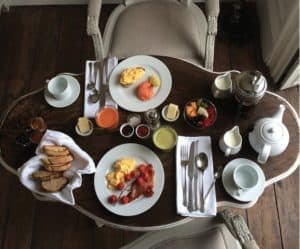
Luxury B&B The Reading Rooms in Margate offers guests virtually whatever they wish for at breakfast, which they have always delivered to guests’ rooms {see page 16).
Guests do not abuse this generosity, says co-owner Louise, but she adds: “Some of our guests have come from different cultures and not known what the items are on the menu. Once we had a period when there were a number of guests who circled everything on the menu. And we delivered it! Literally I took up salmon scrambled egg full English breakfast, sandwiches, porridge, boiled egg, and the whole thing went into the room and disappeared – so I don’t know what they did
with it!”
The room-service breakfast at The Reading Rooms requires two people to prepare and take up to guests, which explains why many small B&Bs don’t deliver breakfast room service, she suggests.
Louise explains the economics: “You may be paying staff £10 per hour PAYE, but factor that into the £90 a night room rate and you still find you can add better services, notably from not having to manage a buffet with a very high level of food wastage. A five-star breakfast buffet for example must still look full when the last guests of the morning to come down to eat,” she says.
Quality and choice
“Whatever type of milk the guest requests with their breakfast within reason they can have,” Louise says. “On the day they arrive I will go out and buy whatever they want, be it gluten-free food, almond milk or soya milk.
“You have to find a balance to be able to give people a feeling that they can have whatever they want and that you have thought about it. People want to feel special. And you can cleverly write a menu which sounds like you are giving them the earth.”
Louise says the key is to treat breakfast like a brunch menu. “It should come with good flavour and high quality. It is your opportunity to shine and not to skimp and to give it that extra.” For example, The Reading Rooms breakfast offers a salad of fruit rather than a fruit salad. “If you were having lunch in a really smart restaurant and you ordered a berry salad of fruit it would entail carefully sliced strawberries laid out on a plate in the way you group food items together, and not mixed up in a bowel with orange juice poured on it, and not boosted with cheaper items. We make sure it is presented beautifully,” she says.
Dinner
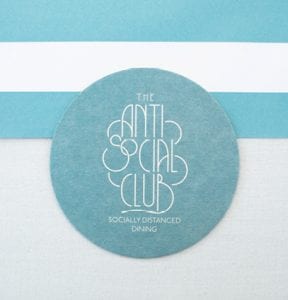
Independent assessors comment that the standards and policies that have been put in place are exemplary – especially the marquee, the safety of staff and meeting guests’ expectations.
Quality in Tourism Director Deborah Heather says: “St Moritz is following a growing trend to putting shielding and pods but is doing so very stylishly creating an exclusive atmosphere. The purpose is to avoid customer contact at pinch points such as the bar and are using apps to enable to guests to order from their table.
“The buffets have all been removed and they have sectioned pods and given each a name – Coral, Mint, Candy Blue. Within each pod is a table and chairs and these are booked as dining spaces giving a feel of an exclusive private dining area, with dividers rather than a door.”
Outdoor dining
The Kings Arms Inn near Yeovil benefits from a large outdoor space, which helps reduce the pressure on indoor dining space. “We are fortunate our space is large, and we have very big beer gardens with roofs over the tables and seats,” says magage Sarah.
The dining room at the inn has had to lose just three dining tables out of 21 pre-lockdown. “The most noticeable change is that we are not allowed to have table cloths and the tables can’t be laid at all, so our elegant restaurant used to look dramatically different to the tables up in the bar area and now it all looks pretty much the same.
“All the areas are nice, and it’s still special to dine in the restaurant which is in a separate part from the bar but for us it all seems quite similar. There’s no salt or pepper on the table and everything’s
in sachets.”
As an inn with a public bar open to non-guests, the Kings Arms Inn faces its own challenges. Its lounge offers bar meals, but the inn itself is renowned for its fine dining restaurant. Unsurprisingly its chef is careful to source food locally wherever he can. “Our butcher and dairy products like cheese for the most part are local and fresh. Our head chef deals with that side of things, and there is seldom any issue except occasionally we night have to rethink what fish they might be serving if they haven’t caught enough.” she says.
The inn has found imposing turnaround times has not been a necessary step to take. “Our beer garden is so large, and so many people have chosen to sit outside, it means everybody can still have their tables for as long as they need.”
She reflects, “It has been nice. They have still been getting the same treatment they were before without feeling rushed.” This has obviously been helped by the good weather, but she still thinks that even when it turns, she won’t face a problem. If someone were to book a table for 7pm and we gave them two hours that would take them to 9pm, by when we stop serving food anyway. It may make it difficult from a drinking point of view, but we’re more focused on dining than drinking,” she says.
COVID-19 specific Guidelines
- The Quality in Tourism Safe, Clean & Legal accreditation has been updated to include COVID-19 specific guidelines
- The scheme consists of a set of cleaning protocols, specific best practice guidelines
- Operators are supported by our assessors who will guide people through the process
- Quality in Tourism will visit every property to validate their risk assessment and guide them on any additional actions that they can take.
- Quality in Tourism has a Primary Authority Partnership with Cornwall Council, which has been ratified by the Secretary of State. This means that all the guidance has been verified by a Government official. Any changes to legislation / guidance comes to us via our partnership.
Key considerations:
- Clear communication of what you offer
- Check your commercial kitchen can run effectively with social distancing guidelines in place
- Adaptations to your menu to reflect a reduced workforce or other changes
- Minimise the contact between front of house and back of house teams e.g. at the hot plate take a step back when either side is delivering or collecting meals
- Include screens where needed
- Adhering to social distancing and clearly telling the story to the customer through signage, communication prior to and on arrival.
Solutions to the guidelines include:
- Ordering through an app.
- Serving tables so that food is brought to a table by diners, staff step back and diners take the food from the table
- Central chalk board or sign for menussign for menus
- Staggering arrival times



